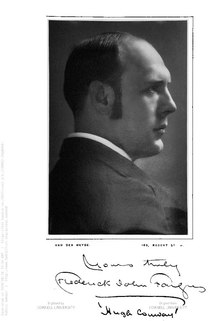A Quote by J. R. R. Tolkien
It is not our part to master all the tides of the world, but to do what is in us for the succour of those years wherein we are set, uprooting the evil in the fields that we know, so that those who live after may have clean earth to till. What weather they shall have is not ours to rule.
Related Quotes
Those who will may raise monuments of marble to perpetuate the fame of heroes. Those who will may build memorial halls to remind those who shall gather there in after times what manhood could do and dare for right, and what high examples of virtue and valor have gone before them. But let us make our offering to the ever-living soul. Let us build our benefactions in the ever-growing heart, that they shall live and rise and spread in blessing beyond our sight, beyond the ken of man and beyond the touch of time.
Time will pass, and we shall go away for ever, and we shall be forgotten, our faces will be forgotten, our voices, and how many there were of us; but our sufferings will pass into joy for those who will live after us, happiness and peace will be established upon earth, and they will remember kindly and bless those who have lived before.
Those who know others are intelligent Those who know themselves have insight. Those who master others have force Those who master themselves have strength.Those who know what is enough are wealthy. Those who persevere have direction. Those who maintain their position endure. And those who die and yet do not perish, live on.
Only part of us is sane: only part of us loves pleasure and the longer day of happiness, wants to live to our nineties and die in peace, in a house that we built, that shall shelter those who come after us. The other half of us is nearly mad. It prefers the disagreeable to the agreeable, loves pain and its darker night despair, and wants to die in a catastrophe that will set back life to its beginnings and leave nothing of our house save its blackened foundations.
Are we to have a censor whose imprimatur shall say what books may be sold, and what we may buy? And who is thus to dogmatize religious opinions for our citizens? Whose foot is to be the measure to which ours are all to be cut or stretched? Is a priest to be our inquisitor, or shall a layman, simple as ourselves, set up his reason as the rule of what we are to read, and what we must believe?
What I must do is all that concerns me, not what people think. This rule,equally arduous in actual and intellectual life, may serve for the whole distinction between greatness and meanness. It is the harder, because you will always find those who think they know what is your duty better than you know it. It is easy in the world to live after the world's opinion; it is easy in solitude to live after our own; but the great man is he who in the midst of the crowd keeps with perfect sweetness the independence of solitude.
A child rightly trained may be a world-wide blessing, with an influence reaching onward to eternal years. But a neglected or misdirected directed child may live to blight and blast mankind, and leave influences of evil which shall roll on in increasing volume till they plunge into the gulf of eternal perdition.
To sow, that others may reap; to work and plant for those that are to occupy the earth when we are dead; to project our influences far into the future, and live beyond our time; to rule as the Kings of Thought, over men who are yet unborn; to bless with the glorious gifts of Truth and Light and Liberty those who will neither know the name of the giver, nor care in what grave his unregarded ashes repose, is the true office of a Mason and the proudest destiny of a man.
The past is our treasure. Its works, whether we know them or not, flourish in our lives with whatever strength they had. From it we draw provision for our journey, the collected wisdom whose harvests are all ours to reap and carry with us, though we may never live again in the fields that grew them.
Many people do not know that they can strengthen or diminish the life around them. The way we live day to day simply may not reflect back to us our power to influence life or the web of relationships that connects us. Life responds to us anyway. We all have the power to affect others. We may affect those we know and those we do not even know at all. . . . Without our knowing, we may influence the lives of others in very simple ways.





































